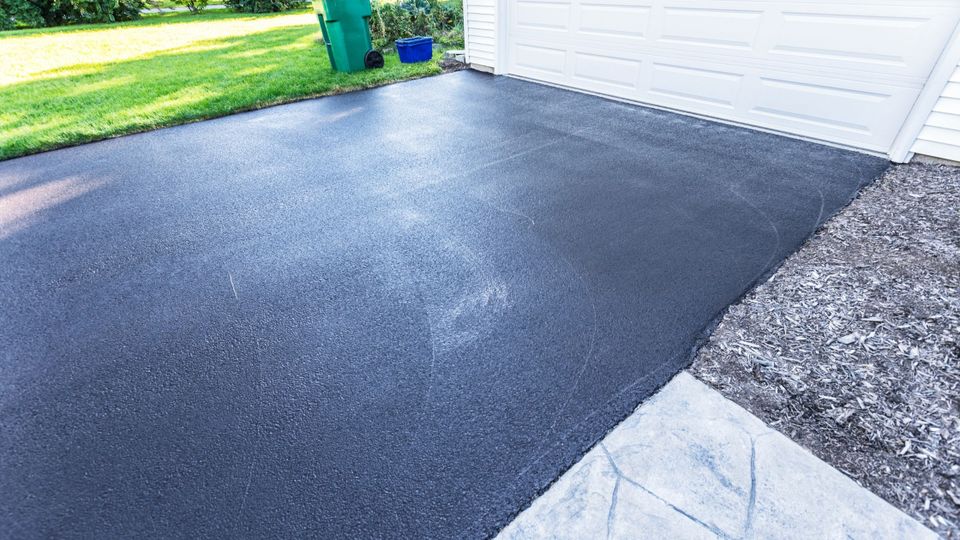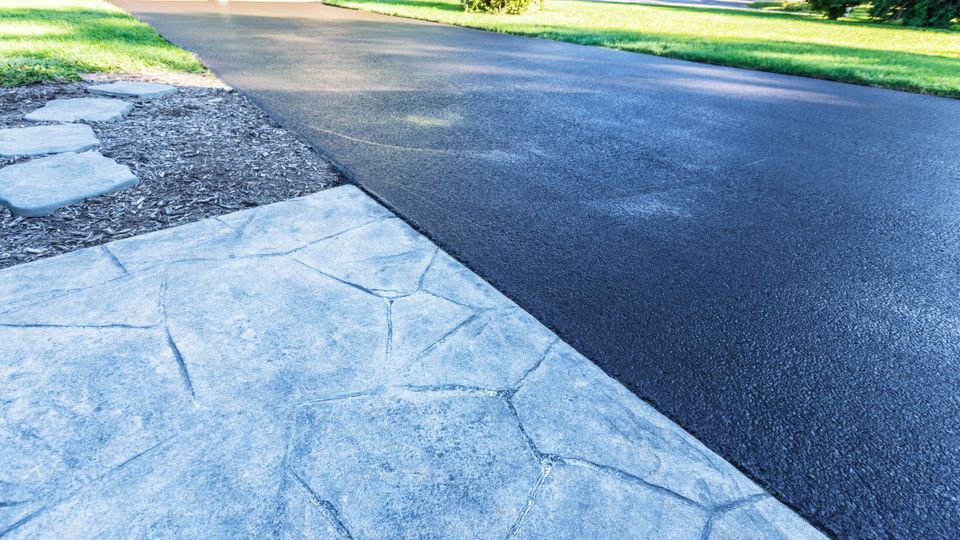

When was the last time you gave your concrete driveway the attention it deserves? If you're like many homeowners, you might not realize just how important sealing your driveway is for its longevity and appearance. Sealing concrete driveways can dramatically extend their life, protect them from the elements, and keep them looking as beautiful as the day they were poured.
This guide will explain the importance of sealing your driveway, how to effectively seal a concrete surface, and tips for maintaining its pristine look over time.
This guide will explain the importance of sealing your driveway, how to effectively seal a concrete surface, and tips for maintaining its pristine look over time.
Why Seal Your Concrete Driveway?

Your driveway endures constant stress every day. From the weight of heavy vehicles to the stains caused by oil leaks and the harsh impacts of rain and snow to the damaging effects of UV rays, its exposure to wear and tear is relentless. Just like walkways, driveways without appropriate protection can develop cracks, become discolored, or erode over time, leading to an old and damaged appearance. This degradation not only affects the visual appeal but can also impact the structural integrity of the driveway.
Moreover, sealing your concrete driveway significantly enhances its appearance. Whether your concrete is standard or features decorative elements, a high-quality sealer can rejuvenate its colors and provide a polished, professional finish. This enhancement boosts curb appeal and adds value to your property.
Did you know? Sealing a concrete driveway effectively creates a protective barrier that shields the surface from moisture, chemicals, and daily wear. This barrier is crucial in preventing water from penetrating the concrete, which is essential to avoid the development of cracks and damage from the freeze-thaw cycles common in colder climates.
Moreover, sealing your concrete driveway significantly enhances its appearance. Whether your concrete is standard or features decorative elements, a high-quality sealer can rejuvenate its colors and provide a polished, professional finish. This enhancement boosts curb appeal and adds value to your property.
Did you know? Sealing a concrete driveway effectively creates a protective barrier that shields the surface from moisture, chemicals, and daily wear. This barrier is crucial in preventing water from penetrating the concrete, which is essential to avoid the development of cracks and damage from the freeze-thaw cycles common in colder climates.
The Best Time to Use Concrete Sealers

Timing plays a pivotal role when it comes to sealing concrete driveways. Ensuring that the timing aligns with the condition of the concrete can significantly enhance the durability and appearance of your driveway. Experts generally advise sealing new concrete surfaces after allowing them adequate time to cure, which typically takes about 28 days. This waiting period is crucial because it enables the concrete to harden fully, making it more receptive to the sealer application and ensuring optimal effectiveness.
For existing driveways, it is recommended that they be resealed every 2–3 years. This frequency can vary based on factors such as the level of wear and the prevailing climate conditions in your area. Driveways exposed to harsher weather or frequent use may require more frequent attention.
If you begin to observe signs of fading, discoloration, or a noticeable decrease in water repellency, it is likely an indication that your driveway needs another layer of sealant. Regular maintenance not only helps to preserve your driveway's aesthetic appeal but also extends its lifespan by protecting it from various elements.
Quick tip: When planning to seal your concrete, optimal weather conditions can significantly affect the outcome. The best conditions for sealing involve mild and dry weather. Ideally, you should aim for temperatures between 50°F and 85°F. It's advisable to avoid sealing on rainy or humid days, as excessive moisture can interfere with the sealer's ability to adhere properly and cure effectively.
For existing driveways, it is recommended that they be resealed every 2–3 years. This frequency can vary based on factors such as the level of wear and the prevailing climate conditions in your area. Driveways exposed to harsher weather or frequent use may require more frequent attention.
If you begin to observe signs of fading, discoloration, or a noticeable decrease in water repellency, it is likely an indication that your driveway needs another layer of sealant. Regular maintenance not only helps to preserve your driveway's aesthetic appeal but also extends its lifespan by protecting it from various elements.
Quick tip: When planning to seal your concrete, optimal weather conditions can significantly affect the outcome. The best conditions for sealing involve mild and dry weather. Ideally, you should aim for temperatures between 50°F and 85°F. It's advisable to avoid sealing on rainy or humid days, as excessive moisture can interfere with the sealer's ability to adhere properly and cure effectively.
Choosing the Right Concrete Driveway Sealer

Not all sealants are created equal, and selecting the right one for your driveway can significantly impact its durability, appearance, and overall maintenance. When choosing a sealant, it's essential to consider your specific driveway needs, preferences, and the environmental conditions your concrete will face.
Here are the most common types of concrete driveway sealers to consider:
Did you know? Penetrating sealers are often considered the top choice for those seeking maximum durability and protection, making them a preferred option for driveways in challenging environments. On the other hand, acrylic sealers are favored for their ability to enhance aesthetics, especially on decorative concrete surfaces, offering a beautiful finish that highlights the natural beauty of the material.
Here are the most common types of concrete driveway sealers to consider:
- Penetrating Sealers: These sealers are particularly suited for driveways exposed to heavy traffic and harsh weather conditions, such as frequent rain or freezing temperatures. They work by deeply soaking into the concrete surface, creating a barrier that offers long-lasting protection against moisture, chemicals, and the natural wear and tear that occurs over time. This type of sealer is excellent for those seeking durability and minimal maintenance, as it requires less frequent reapplication than other types.
- Acrylic Sealers: It may be the right choice if you have decorative concrete and want to enhance its aesthetic appeal. These sealers are designed to improve the color of your driveway, providing a glossy and attractive finish. While they effectively protect against UV damage, which can cause fading and discoloration, they require more frequent reapplication to maintain their appearance and protective qualities. Acrylic sealers are popular for those who prioritize visual appeal and are willing to invest in regular upkeep.
- Polyurethane Sealers: Known for their exceptional durability, they are ideal for areas prone to heavy wear and tear, such as driveways that endure frequent vehicle traffic or exposure to harsh environmental conditions. These sealers form a strong, protective coat over the concrete surface, offering excellent resistance to chemicals, abrasions, and other forms of damage. They are a great choice for homeowners seeking both durability and a refined appearance, as they can provide a glossy finish similar to acrylic sealers.
Did you know? Penetrating sealers are often considered the top choice for those seeking maximum durability and protection, making them a preferred option for driveways in challenging environments. On the other hand, acrylic sealers are favored for their ability to enhance aesthetics, especially on decorative concrete surfaces, offering a beautiful finish that highlights the natural beauty of the material.
How to Properly Apply Concrete Sealer

Applying a concrete driveway sealer doesn’t have to be complicated. Follow these simple steps to ensure your driveway gets the perfect finish:
Quick tip: Always read the manufacturer’s instructions for your specific sealer to get the best results.
Step 1: Prepare the Surface
Clean the surface thoroughly. Remove dirt, oil stains, and debris using a pressure washer or a stiff brush and cleaning solution. A clean surface ensures the sealer adheres appropriately.Step 2: Test for Moisture
Before sealing, check for moisture retention in your driveway. You can do this with a plastic sheet. Tape the sheet to the concrete for 24 hours—if moisture builds up underneath, the surface isn’t ready for sealing.Step 3: Apply the Sealer
Use a roller or sprayer to apply the sealer in thin, even layers. Start at one end of the driveway and work to the other, ensuring complete coverage.Step 4: Allow Proper Drying Time
Give the sealer time to dry—typically 24 to 48 hours. During this period, ensure no vehicles or foot traffic are allowed on the driveway.Quick tip: Always read the manufacturer’s instructions for your specific sealer to get the best results.
Quick Tips for Maintaining a Sealed Concrete Surface

Once sealed, maintaining your new concrete driveway is easy but essential to keeping it looking great. Here’s how:
Did you know? Proper maintenance can extend the lifespan of your sealant by up to 50%, saving you time and money in the long run.
- Clean Regularly: Sweep away dirt and debris weekly. Hose it down or use a mild detergent to remove stains.
- Avoid Harsh Chemicals: De-icing salts and strong solvents can damage the sealer. Opt for non-abrasive, driveway-safe cleaners.
- Inspect Frequently: Look for signs of wear, like fading or scratches in the sealer. Resealing when necessary will keep the protective barrier intact.
Did you know? Proper maintenance can extend the lifespan of your sealant by up to 50%, saving you time and money in the long run.
Frequently Asked Questions
How often should I reseal my concrete driveway?
The frequency of resealing depends on the type of sealer used and the weather conditions in your area. Generally, resealing every 2-3 years is recommended for optimal protection and appearance.Can I seal a newly poured concrete driveway?
Wait for the concrete to cure fully before applying a sealer. This typically means waiting at least 28 days after pouring new concrete to ensure complete curing and effective sealing.What should I do if my driveway sealer starts peeling?
If the sealer shows signs of peeling, it might indicate improper application or underlying moisture issues. Remove the affected sealer by power washing or using a sealer stripper, and address any moisture problems before reapplying a new layer of sealer.Is one type of sealer better than another?
Different sealers offer varied levels of protection and finish. Acrylic sealers are popular for their ease of use and affordability, while epoxy and polyurethane sealers provide a more durable and long-lasting finish. Choose the sealer that best aligns with your needs and budget.Keep Your Driveway Beautiful and Strong
Sealing concrete driveways is an investment in both durability and curb appeal. With the right sealer, proper application, and consistent maintenance, your driveway can withstand daily use and harsh weather for years.
Looking for the best concrete sealer? Start by choosing a sealant that suits your needs and climate. Take action today to protect your sealed driveway and elevate your home’s exterior with a lasting shine.
Looking for the best concrete sealer? Start by choosing a sealant that suits your needs and climate. Take action today to protect your sealed driveway and elevate your home’s exterior with a lasting shine.
